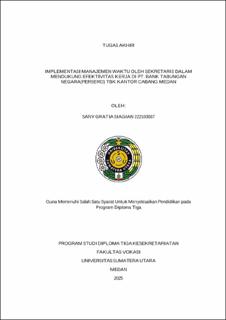| dc.description.abstract | The high complexity of secretarial work in the banking sector demands optimal time management skills to ensure that administrative tasks are completed effectively. Based on preliminary observations and interviews with three secretaries at PT. Bank Tabungan Negara (Persero) Tbk Medan Branch Office, it was found that most secretaries experienced difficulties in setting task priorities, organizing time systematically, and handling simultaneous assignments from various work units. These findings raised key questions about the extent to which time management affects secretarial work effectiveness. Time management plays an important role in supporting work effectiveness, especially for a secretary who is responsible for arranging the schedule of superiors and managing the company’s administrative activities. The secretary at PT. Bank Tabungan Negara (Persero) Tbk Medan Branch Office is required to be able to implement good time management so that every task can be completed on time. This study aims to explore the time management practices of secretaries, examine their work effectiveness, analyze the influence of time management on work effectiveness, and identify internal barriers in its implementation. A qualitative approach with an intrinsic case study design was employed, focusing on one specific research location. Informants were selected purposively, and data were collected through in-depth interviews, non-participant observations, document analysis, and data triangulation. The findings indicate that most secretaries have implemented effective time management through the use of to-do lists, digital calendars, and daily work schedules. Their work effectiveness is reflected in their discipline, timeliness, and adaptability in managing urgent tasks. However, internal barriers such as excessive multitasking, heavy workloads, and the lack of formal training remain significant challenges. This study concludes that effective time management has a significant impact on secretarial work effectiveness. Therefore, organizational support in the form of training and a more structured work system is essential to optimize the secretarial role within a dynamic work environment. | en_US |


